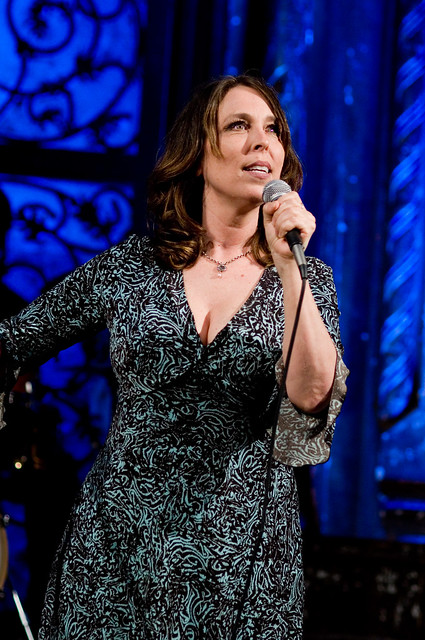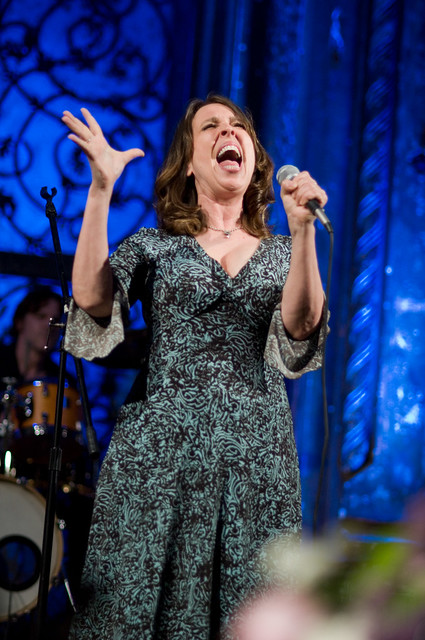I admit that I walked into Susan Mosher’s new show The Great Daisy Theory as a fan (and I expect many of the people in the room were there as diehard fans of either Susan Mosher or musical theater – or of both, like me). Having intensely enjoyed her previous work in Cashino, in which Mosher plays half of a ludicrous lounge act performing chaotic (yet brilliant) musical medleys combining things like the hits of the band Chicago with songs from the musical Chicago, I expected the format to be a cabaret-style song and monologue piece with a loose story line. I was not wrong about that. And I had heard that in addition to Mosher’s usual hilarious, exaggerated humor, that there were some more serious, dramatic bits. I kind of thought, “ok, that’s pretty much what everyone says when they want to be taken a bit more seriously.” I was quite wrong about that.

Some parts of the show left me clutching at my chest like a character from a Jane Austen novel, wondering how everyone around could be laughing. so. hard. at what was clearly searingly painful truth. But I also realized that my own tears of laughter and my own tears of pain were so coming one so close on the heels of the other that I could barely discern which was which.
And, I cry. I’m one of those people. I cry. I always, always cry at curtain calls. Always. And that crying becomes flat-out sobbing if you involve a medley of reprises of the show’s most jubilant numbers. Susan Mosher’s ability to turn every song into a stage full of chorus members grinning and taking their bows just tickles my waterworks pretty much every time she opens her mouth to belt out a number. Any number.
So, you know. I liked it.
But let me see if I can tell you why. Aside from it just feeling like one giant, jubilant curtain call.
I love “Georgy Girl.” It’s a nice, upbeat little ditty that leaves me whistling. I know every word and never fail to sing along. But I’ve never really heard the words until I heard Susie Mosher sing it. And much to my surprise, “Georgy Girl” is actually a tragic coming-of-age number about wanting – and failing – to fit in. When put together with It’s A Beautiful Day’s “White Bird,” the resulting medley becomes a heartbreaking anthem of a lost young girl. But, you know, snappy.
Susan Mosher excels at making it snappy – but without sacrificing the truth. “Cry Me a River” is bitter, and hilarious, and a vaguely ironic look at an old standard. But I challenge you to find me the person who does not sit in the dark and feel a little blindsided by the honesty in Mosher’s performance. While, you know, laughing really, really hard.

The operatic sequence depicting a typical fight with her mother was ridiculous and witty, but if you listen past the form to the story being told, it makes you wonder how this child survived to be a woman with her sense of humor so firmly intact. When she screams out “rock bottom is what I’m trying to keep her from!” you laugh, at the ridiculousness of it all. But then just as suddenly you feel the eight year old child responsible for keeping her mother safe. And you can’t help but cry her a river.
It was lovely, hilarious, riveting, moving, toe-tapping, tragic, honest and extreme. What more could you ask for in an autobiographical one-woman manic musical dramedy?
(Look to The Great Daisy Theory’s website for updated information about showtimes. Photos shown are not from “The Great Daisy Theory” but from an earlier performance. © 2010 Marnie Ann Joyce. )
